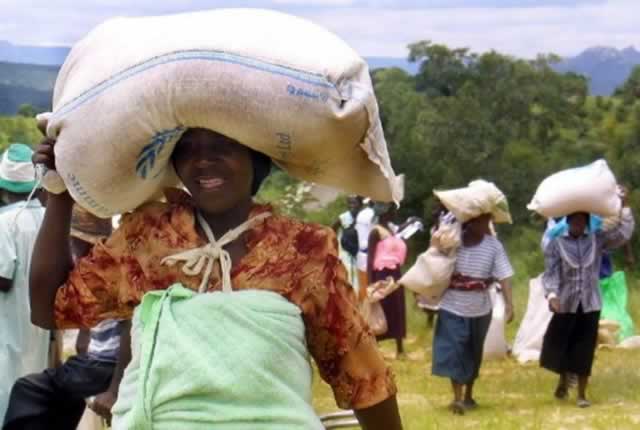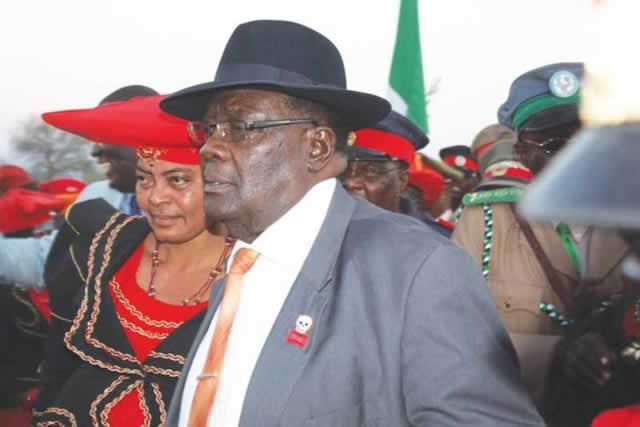Tragic dependency on food aid


Zimbabweans should desist from the culture of dependency and do more to provide for themselves to the level of pre-independence
Sekai Nzenza on Wednesday
“We do not have to work for food like we used to do in the old days any more. We have donors, my friend. They give us food,” says our village neighbour Jemba, rolling his cigarette with a piece from my newspaper.
He is arguing about donors and the good harvests of the past with my cousin Piri and my brother Sydney.
Back here in the village, we are in the middle of the harvest season.
This year the rains were so much better than in the past few years. Our harvest is almost as good as it used to be when we were growing up here. We grew a few acres of maize, rapoko or red millet, groundnuts and a huge a crop of drought resistant sorghum.
It’s late Saturday afternoon. The sun is setting over the Homa hills and I am sitting on the bench next to the door of my mother’s village hut.
Actually, it is not my mother’s hut anymore because she died almost two years ago.
I own this hut now because I am the oldest daughter and apart from my young sister Vongai, my other sisters are in the Diaspora trying to make those faraway places their homes.
Opposite me, sitting on a big log that we use as a bench, is my brother Sidney and Jemba.
They are busy drinking Chibuku from the new transparent bottles.
Piri is sitting next to them sipping a different type of beer from a white plastic cup.
She does not normally drink from a cup like that. When Jemba goes and there are no more neighbours passing by, Piri and Sydney will suddenly “find” the beer from the cool box full of ice that we brought from Harare.
They will drink straight from the bottles. For the moment, Jemba and any passers are given Chibuku because Sidney and Piri do not want to share the good beer. Kunyima.
“I am going to cut down all the trees down in Mangenda then reclaim my parents’ field,” Sidney says. Jemba tells him that he has gone mad. “Why do you need to break your back at your age cutting down trees to clear a field?”
“Ask her,” Sidney points at me. “She will tell you that down in the fields we called Mangenda, we used to grow more than we could eat. We do not need to rely on donors for food. I want to fill the granary again with maize and rapoko, the way my mother used to do,” Sidney says. “Is that not so, my sister?”
I recall that one day, many years ago, when we were growing up in this village, my mother asked sabhuku, the village head, for an additional piece of land.
In those days, long before independence, land was scarce. There were many of us children and the land around here was too close to the hills and rocky.
It had always been like this, ever since my grandfather, Sekuru Dickson and his three brothers were moved from what became Charter Estates and got settled here after the Land Apportionment Act of 1933.
The Rhodesian government called this area the Tribal Trust Lands. We did not own this land. We still don’t.
When my father married my mother, sabhuku gave him the land close to the hills. It was a very scenic area, still is, but the soil was not fertile. We added cow manure and mulch from the hills. The agricultural officer, mudhumeni, came to teach us how to build terraces and stop the soil from running down to the valley when the rains came. But the land was still not very productive.
Then sabhuku allocated my mother virgin land further down the river near the falls called Mangenda.
It was a long way to this field. We woke up at dawn, carried maize-meal, two pots, vegetables, cooking oil and salt to make our lunch down there.
The water was nearby and there was plenty of firewood. The soil was made of thick black and it was fertile.
There were trees everywhere. Our uncles and other strong neighbours came to help us cut down the trees and burn the stumps until the fields were clear. Because it was all virgin land, we did not use any manure at all.
We took a pair of oxen with us to plough the three fields. Then we sowed the maize and ground nuts. Few weeks later, we did the weeding and escaped the field work when we went to boarding school.
But at Easter, during the school break, we came back to Mangenda to harvest the crops.
I recall finding the fields full of healthy fat maize cobs, pumpkins, cucumbers, okra, ipwa, water melons and green beans. We lit the fire and roasted the corn, drank sparkling water from the spring well that we fetched from in-between the big rocks where baboons used to frequent.
The baboons had the courtesy to stay away when we arrived. By the time we returned to boarding school in May, the harvest was still far from complete. My mother relied on her relatives to help her.
My mother turned the fields in Mangenda into a huge harvest. We filled all four compartments in the granary, takazadza matura. One year she harvested many sacks of peanuts and sold a whole sack to Mr Jack, the European trader with a chain of stores across the rural areas from Enkeldoorn (Chivhu) all the way to Buhera. Mr Jack’s stores were always full of sugar, flour, Impulse perfume, Ambi Skin lightening cream, cooking oil, cloths, petticoats, underwear, soap, batteries, Coke, Fanta, sweets, biscuits and everything Western that needed money to be bought.
My mother did not get cash for her bucket of shelled ground nuts at Mr Jack’s store. Like the other village women farmers, she was given a packet of sugar and soap for her labour. Other women got petticoats and underwear. But what did it matter in those days? There was so much surplus food.
Food handouts were unknown. The chief looked after widows and other vulnerable people through a system we called zunde ramambo. Although there were stories of poor people who used to move from one village to another asking for food, kupemha, hunger was not a serious issue.
“Akambouya naniko madonor acho?” asks Piri, meaning, who brought the donors. Jemba gives me a funny grin and points at me saying, “Ask them. You are the NGO people. Are you not the ones who brought the donors?”
Before I can find an explanation as to when the donors came here, Sidney puts on his retired school teacher voice and tells us that before independence we did not talk about the donors.
Throughout the liberation war, we did not see them. But soon after independence, Zimbabwe became a very attractive country, especially when it was compared to apartheid South Africa.
We were a beautiful new country, recently liberated from years of colonial rule.
Western countries loved us. Volunteers from many countries in Europe came here to teach and give us training in our hospitals, fields, hotels and in government offices.
Many partnerships were formed because our friends from overseas were many.
There were scholarships to study in Cuba, Soviet Union, China, Japan, UK, Germany, America, Australia and everywhere. Aid poured into the country. Words like donor, NGOs and food handouts became part of our language.
We did not even try to translate those words into our indigenous languages. That is why we still do not have a word for “donor” in Shona.
Soon after independence in 1980, most of the food eaten in this country was grown in the rural areas. On the white owned farms, they grew maize for cattle, as they had always done. White farmers exported massive quantities of tobacco because Zimbabwe has one of the best climate and soil for growing tobacco in the whole world.
The Agricultural Rural Development Authority (ARDA) farms produced surplus food. The Grain Marketing Board silos were full of maize, from Mutoko to Karoi and right across the country. That was the time when this country was called the bread basket of Southern Africa.
“So, what happened?” Jemba asks interrupting Sidney’s historical speech.
“I think we have become lazy,” says Piri, going back into the kitchen hut to discreetly pour beer into her white cup. She comes back and addresses Jemba.
“Before and after independence, this country was well fed. Not anymore. Look at you Jemba. You are young but you look like a skinny little old man because you want to wait for the donor to give you seeds to grow.
“Then you wait for the donor to give you fertiliser. Grow up and stop begging from the donor.”
“Ah . . . a! Say what you like about the European donors, but the truth is, they will never let the African starve. Never!” says Jemba.
“We need new attitudes and new methods of farming to stop this illness called dependency,” says Piri.
Jemba chuckles, lights another cigarette using my newspaper, and says to Piri, “If all the donors pack their bags and leave today, will you survive?”
“What difference would that make to my life today? Nothing,” says Piri.
Dr Sekai Nzenza is the CEO of Rio Zim Foundation. She writes in her personal capacity.










Comments